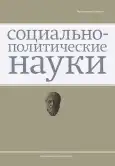Evolution of the Institute of Elections in the Structure of Organization and Functioning of the Modern Russian State
- Autores: Turkova E.V.1, Bochanov M.A.1,2, Popov S.I.3
-
Afiliações:
- Central Russian Institute of Management – branch of the RANEPA under the President of the Russian Federation
- Financial University under the Government of the Russian Federation
- Peoples’ Friendship University of Russia named after Patrice Lumuba
- Edição: Volume 13, Nº 3 (2023)
- Páginas: 21-28
- Seção: Political Institutions, Processes and Technologies
- URL: https://bakhtiniada.ru/2223-0092/article/view/145542
- DOI: https://doi.org/10.33693/2223-0092-2023-13-3-21-28
- EDN: https://elibrary.ru/DOGQPH
- ID: 145542
Citar
Resumo
The scientific article studies the evolution of the institution of elections in the structure of the organization and functioning of the modern Russian state. The authors analyze elections as an integral part of the political system of modern Russia. The issues of organizing and holding elections in Russia are considered, problems associated with a decrease in the interest and activity of citizens in the conduct of elections are fixed, which negatively affects the political agenda of the state. The article focuses on the latest changes in the legislation regarding elections in Russia, and also analyzes the consequences of the introduction of new rules for the organization and functioning of the modern Russian state. The authors conclude that the institution of elections in Russia continues to evolve, and this evolution is connected with the problems existing in society. Despite the problems that arise during the elections, this institution is a system-forming element of the modern Russian state. Elections play a key role in social processes due to the fact that they are the main political channel of communication between state power and society.
Palavras-chave
Texto integral
##article.viewOnOriginalSite##Sobre autores
Evgenia Turkova
Central Russian Institute of Management – branch of the RANEPA under the President of the Russian Federation
Autor responsável pela correspondência
Email: turkovaeugene@mail.ru
ORCID ID: 0009-0008-6697-156X
Código SPIN: 8761-8274
master’s degree
Rússia, OrelMaxim Bochanov
Central Russian Institute of Management – branch of the RANEPA under the President of the Russian Federation; Financial University under the Government of the Russian Federation
Email: max8797@list.ru
ORCID ID: 0000-0002-0802-1418
Código SPIN: 4326-4510
Candidate of Political Sciences, Associate Professor
Rússia, Orel; MoscowSergey Popov
Peoples’ Friendship University of Russia named after Patrice Lumuba
Email: serjpo@mail.ru
Código SPIN: 9513-2598
Candidate of Political Sciences, Associate Professor
Rússia, MoscowBibliografia
- Makarenko B.I. Elections: Functions and influence on political institutions. Political Science. 2019. No. 1. Pp. 13–32. (In Rus.)
- Potyakin A.A. Convention on the Standards of Democratic Elections, Electoral Rights and Freedoms in the States Members of the Commonwealth of Independent States in the system of international documents on human rights. Dialogue: Politics, Law, Economics, 2022. No. 2. Pp. 23–27. (In Rus.)
- Veremeev A.V. The concept of elections and their functions. The main definitions characterizing the institution of elections. Scientific Aspirations. 2013. No. 4 (8). Pp. 9–13. (In Rus.)
- Avakyan S.A. Constitutional lexicon: State-legal terminological dictionary. Moscow: Yustitsinform, 2015. 640 p.
- Kolyushin E.I. Elections and suffrage in the mirror of judicial decisions: monograph. Moscow: Norma; INFRA-M, 2020. 384 p.
- Kinyasheva Yu.B. Theoretical foundations for studying elections as a socio-political conflict. Izvestiya TulGu. Humanitarian Sciences. 2010. No. 2. Pp. 243–250. (In Rus.)
- Shabalin G.Yu. The concept of elections as a constitutional institution. Bulletin of the Mari State University. Series: Historical Sciences. Legal Sciences. 2019. No. 1 (17). Pp. 82–86. (In Rus.)
- Trykanova S.A. Harmonization of short stories in the electoral law and traditional theoretical and applied approaches to the definition of the concept of “elections”. Education. The Science. Scientific Personnel. 2021. No. 2. Pp. 93–95. (In Rus.)
- Kim Yu.V. Suffrage: textbook for universities. Moscow: Yurait, 2023. 385 p.
- Kapranova Yu.V. The phenomenon of electoral technologies in modern Russia. Yurist-Pravoved. 2022. No. 1 (100). Pp. 128–133. (In Rus.)
- Ezhov D.A. Dynamics of the representation of the institute of elections in the Russian mass consciousness. Bulletin of MGOU. 2021. No. 2. Pp. 8–22. (In Rus.)
- Baranov N.A. Cooperation of countries in adapting electoral practices to the pandemic: international experience and national features. Greater Eurasia: Development, Security, Cooperation. 2022. No. 5-1. Pp. 363–367. (In Rus.)
- Baranov N.A. Elections as an institution of trust: features of functioning in the context of the COVID-19 pandemic. Administrative Consulting. 2021. No. 10 (154). Pp. 10–21. (In Rus.)
- Scientists have found that e-voting increases voter turnout [e-voting]. URL: https://nom24.ru/info/events/uchenye-vyyasnili-chto-elektronnoe-golosovanie-uvelichivaet-yavku-izbirateley/ (date of accesses: 23.05.2023).
- Postriganova A.V. Elections as a mechanism for the legitimation of state power in modern Russia: Abstract of dis. ... of Cand. Sci. (Polit.): 23.00.02. Moscow: Lomonosov Moscow State University, 2005. 19 p.
- Mikheeva T.N., Shabalin G.Yu. Improving the legislation on electoral public control. Actual Problems of Russian Law. 2021. No. 3 (124). Pp. 22–27. (In Rus.)
- Morozova O.S. Election observation during a pandemic: A new reality. Bulletin of Tomsk State University. Philosophy. Sociology. Political Science. 2022. No. 67. Pp. 149–158. (In Rus.)
Arquivos suplementares










